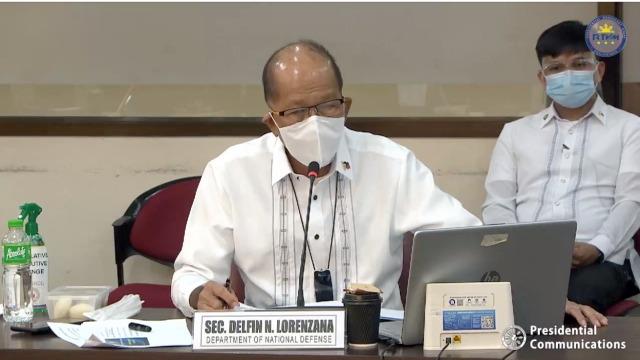Lorenzana: Termination of pact not an attack vs. UP

Defense Secretary Delfin Lorenzana on Wednesday defended his decision to terminate his department's decades-old agreement with the University of the Philippines, saying his move was not an attack against UP.
Since 1989, the UP-DND accord barred state forces from entering UP campuses without prior notice to university officials. Its unilateral termination by Lorenzana a few days ago ignited protests and fears of "red-tagging" and militarization.
At a press conference, Lorenzana confirmed that he did not consult UP before making the decision.
"The agreement is a meeting of two minds. Kung ayaw na ng isa, I think consultation is not needed, it's useless," he said.
But he denied the impression that the termination of the accord was a prelude to a militarization of UP campuses.
"Please understand that we have nothing against UP. This is not an attack against UP or the alumni. Gusto lang namin malinis yung UP sa mga bad elements sa loob," Lorenzana said.
In ending the agreement, the secretary claimed that UP is a venue for "clandestine recruitment" into the Communist Party of the Philippines and the New People's Army. He said that UP students have died in state forces' encounters with communist rebels.
UP President Danilo Concepcion has asked Lorenzana to reconsider, but the secretary said he is only willing to talk if UP would explain its students' deaths.
Equal protection?
Lorenzana repeatedly cited the equal protection clause of the Constitution in asking "what makes UP so special" for having the privilege of requiring state forces to notify its officials before they conduct operations inside campus.
He said other universities do not have the same agreement with the DND.
The accord was signed in 1989 following the abduction of Philippine Collegian staffer Donato Continente. Continente is said to have been tortured into admitting he had a part in the ambush of American soldier James Rowe.
On Wednesday, military spokesman Major General Edgard Arevalo said the agreement could stand in the way of valid military and police operations by requiring prior notice from university officials.
He said the accord is "contrary to public policy" and "inimical to public interest" for requiring an extra step for law enforcement that might make them lose their suspects.
"Paano na lamang po kung mayroong shabu laboratory, for instance, sa loob ng UP community or campus and then meron po tayong valid arrest warrant at search warrant? Ang hinihingi po ng agreement na ito kailangang dadaan muna tayo sa UP administration upang ipaalam bago tayo mag-search. It violates the Rules of Court," Arevalo said.
"Nowhere in the Rules of Court does it say that there's another step that law enforcers should do before they could implement a valid arrest and a valid warrant, therefore it is contrary to public policy," he added.
But when asked if the accord has ever hindered an effort to arrest any suspected communist recruiter inside UP, Lorenzana said no example is needed.
"I think we do not need an example, kasi dapat pantay-pantay lahat ng mga schools. We can do this in Ateneo, why can't we do it in UP?" he said.
Lorenzana earlier said he considers the accord "obsolete." He claimed that UP, in the decades since the pact was signed, has become a "safe haven for the enemies of the state."
Members of the UP community said the termination of the agreement threatens the academic freedom that has allowed its activism to flourish. —KBK, GMA News



